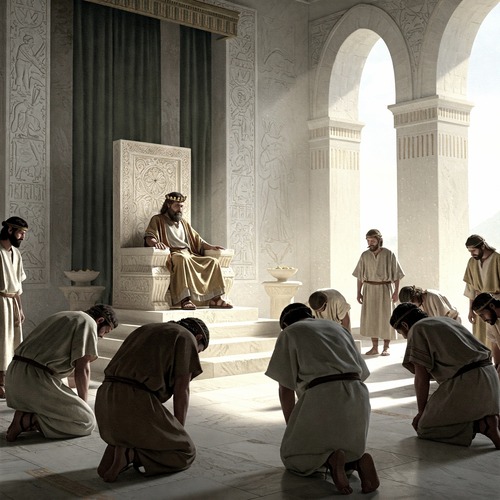Son of David: How Scripture Confirms Jesus’ Royal Lineage
For centuries, Jewish prophecy pointed to a coming Messiah who would fulfil specific ancestral requirements. Chief among these was the promise the Messiah would be a “Son of David”—a descendant of Israel’s greatest king. This wasn’t merely a preference but a divine prerequisite established through covenant promises.
The Messianic lineage requirements were threefold:
- Descendant of Abraham’s (Genesis 22:18)
- From the tribe of Judah (Genesis 49:10)
- From the royal line of David (2 Samuel 7:12-16)
Jesus of Nazareth’s claim to be the Messiah hinges significantly on meeting these ancestral conditions. Let’s examine the biblical evidence that confirms Jesus truly fulfilled these crucial requirements.
THE GENEALOGICAL RECORDS
Matthew’s Royal Genealogy
Matthew’s Gospel opens with a deliberate statement: “The book of the genealogy of Jesus Christ, the son of David, the son of Abraham” (Matthew 1:1). This introduction immediately establishes Jesus’ connection to both Abraham and David—the two most significant ancestral figures in Messianic prophecy.
Matthew then traces Jesus’ lineage through Joseph, Jesus’ legal father, highlighting:
- Descent from Abraham, fulfilling the Abrahamic covenant
- Membership in the tribe of Judah, fulfilling Jacob’s prophecy
- Royal lineage through Solomon, David’s son and heir to the throne
While some question how Jesus could claim Davidic lineage through Joseph if born of a virgin, Matthew addresses this by showing Joseph as Jesus’ legal father. In Jewish law, legal paternity established inheritance rights, including royal lineage.
LUKE’S GENEALOGY: A DIFFERENT PERSPECTIVE
Luke provides a second genealogy (Luke 3:23-38) that differs from Matthew’s account. Scholars believe this represents Mary’s lineage, showing Jesus’ blood connection to David through a different son, Nathan. This would establish Jesus as a biological descendant of David regardless of the virgin birth.
The two genealogies together provide complementary evidence:
- Matthew’s account establishes Jesus’ legal right to David’s throne
- Luke’s account demonstrates Jesus’ physical descent from David’s line
PUBLIC RECOGNITION OF JESUS’ DAVIDIC IDENTITY
Throughout Jesus’ ministry, people repeatedly identified him as “Son of David”—a Messianic title that specifically referenced his Davidic ancestry:
- Blind men seeking healing called out, “Have mercy on us, Son of David!” (Matthew 9:27)
- The Canaanite woman pleaded, “Lord, Son of David, have mercy on me!” (Matthew 15:22)
- As Jesus entered Jerusalem, crowds shouted, “Hosanna to the Son of David!” (Matthew 21:9)
Significantly, Jesus never corrected or rejected the title. In first-century Jewish culture, falsely accepting a royal lineage would have been considered a serious offense. Jesus’ acceptance of the title “Son of David” indicates both the legitimacy of his claim and public recognition of his ancestry.
APOSTOLIC TESTIMONY
The apostles consistently affirmed Jesus’ Davidic lineage in their preaching and writings:
Peter’s Pentecost Sermon: In his foundational Pentecost message, Peter directly connected Jesus to David (Acts 2:29-31).
Paul’s Clear Affirmations: Paul explicitly referenced Jesus’ Davidic ancestry in his letters:
- “concerning his Son, who was descended from David according to the flesh” (Romans 1:3)
- “Remember Jesus Christ, risen from the dead, the offspring of David” (2 Timothy 2:8)
These statements from the earliest Christian teachings show that Jesus’ Davidic lineage was a settled fact among those who knew him best.
JESUS’ OWN UNDERSTANDING
Jesus himself demonstrated awareness of his Davidic heritage while adding profound theological insight:
In Matthew 22:41-46, Jesus asked the Pharisees, “What do you think about the Christ? Whose son is he?” They replied, “The son of David.” Jesus then quoted Psalm 110:1 to show that the Messiah must be both David’s son and David’s Lord – establishing both his human descent from David and his divine nature.
This exchange shows Jesus acknowledging his Davidic heritage while elevating understanding of the Messiah’s identity.
PROPHETIC FULFILLMENT
Jesus fulfilled specific prophecies related to the Davidic Messiah:
- Born in Bethlehem, “the city of David” (Micah 5:2, Luke 2:4, 11)
- Established on “the throne of his father David” spiritually (Luke 1:32-33)
- Praised as “the Root of David” who alone was worthy (Revelation 5:5)
CONCLUSION
The evidence for Jesus’ Davidic lineage is multifaceted and compelling:
- Two independent genealogical records
- Widespread public recognition
- Apostolic testimony
- Jesus’ own teachings
- Fulfilment of specific prophecies
The ancestral connection is so foundational to Jesus’ Messianic identity that the New Testament begins by establishing it (Matthew 1:1) and nearly ends by reaffirming it: “I, Jesus…am the root and descendant of David, the bright morning star” (Revelation 22:16).
The scriptural evidence leaves no doubt: Jesus of Nazareth truly fulfilled the ancestral requirements of the promised Messiah as a son of Abraham, from the tribe of Judah, and through the royal line of David.
SON OF DAVID—RELATED FAQs
How can Jesus be the “Son of David” if born of a virgin? The virgin birth does not negate Jesus’ Davidic ancestry because Jewish inheritance rights passed through legal paternity, not just biological descent. Reformed scholar DA Carson notes Matthew’s genealogy establishes Joseph as Jesus’ legal father, conveying royal inheritance rights. Additionally, many scholars believe Luke’s genealogy traces Mary’s lineage, providing a blood connection to David regardless of the virgin birth.
- Why do Matthew and Luke’s genealogies differ so significantly? The differences reflect distinctive theological purposes rather than historical contradictions. Matthew traces the royal line through Solomon to emphasize Jesus’ legal right to David’s throne, while Luke likely follows Mary’s ancestry through David’s son Nathan. Reformed theologian Michael Kruger explains that these complementary accounts show Jesus’ dual qualification—legal heir through Joseph and blood descendant through Mary—strengthening rather than undermining the case for his Davidic lineage.
- Did the early Jewish opponents of Christianity dispute Jesus’ Davidic ancestry? Interestingly, early Jewish opponents of Christianity never contested Jesus’ Davidic lineage, despite challenging other aspects of His messianic claims. The Talmud and other Jewish writings from the period criticise Jesus on various grounds, but His Davidic ancestry appears to have been sufficiently established that it wasn’t a point of contention. Reformed historian Craig Blomberg suggests this silence constitutes significant evidence that Jesus’ Davidic connections were historically recognised.
How important was Davidic descent in first-century messianic expectations? Davidic lineage was absolutely central to Jewish messianic hopes. The Dead Sea Scrolls, particularly the “Son of God” text (4Q246), demonstrate the expectation of a Davidic messiah who would restore Israel. Reformed scholar Richard Bauckham points out that while various messianic figures emerged in first-century Judaism, claimants without Davidic credentials were dismissed from serious consideration as the promised Messiah.
- Could Jesus’ genealogical records have been fabricated by early Christians? This is highly unlikely for several reasons. Both genealogies were published within a generation of Jesus’ lifetime when family records were meticulously maintained at the Temple and could be verified. Reformed scholar NT Wright emphasises these claims would have been easily falsifiable if inaccurate, especially given the hostile Jewish leadership’s motivation to discredit Christian claims. Additionally, the inclusion of problematic figures (like Tamar, Rahab, and Bathsheba) in Matthew’s genealogy suggests historical accuracy rather than idealised fabrication.
- How does Jesus fulfil the promise that David’s descendant would sit on his throne forever? Jesus fulfils this promise spiritually rather than politically, which challenges traditional expectations but aligns with prophetic themes of the New Covenant. As Reformed theologian Edmund Clowney explains, Jesus inaugurated a spiritual kingdom that transcends geographical boundaries while maintaining continuity with David’s throne. This kingdom understanding helps reconcile the seemingly unfulfilled aspects of literal throne inheritance with biblical promises of an eternal Davidic kingdom.
Why does Paul emphasise Jesus’ Davidic lineage so much less than the Gospel writers? Paul’s epistles address primarily Gentile congregations where Davidic lineage carried less theological significance than in Jewish contexts. When writing to predominantly Jewish audiences, however, Paul does emphasise Jesus’ Davidic ancestry (Romans 1:3). Reformed scholar Thomas Schreiner notes Paul’s approach reflects contextual adaptation rather than diminished importance of the Davidic connection—he presents the same Christ but emphasises different aspects of his identity based on his audience’s background and needs.
SON OF DAVID—OUR RELATED POSTS
-
- A Prophet Like Moses: How Jesus Fulfilled the Deuteronomy 18 Test
- Who Is Isaiah 53’s Suffering Servant: The Messiah or Israel?
- How the Torah Points to Christ: Prophecies, Patterns, Promises…
- The Tabernacle: How Does It Point to Christ’s Incarnation?
- Types of Christ and His Cross in the Old Testament
- Jesus in the Old Testament: Glimpses of the Coming Saviour
- Jesus in the Jewish Festivals: From Shadow to Substance
Editor's Pick

Will We Remember This Life in Heaven? What Isaiah 65:17 Means
"Will I remember my spouse in heaven? My children? Will the joy we shared on earth matter in eternity?" These [...]

From Empty to Overflow: The Abundant Life Jesus Promised
(AND WHY YOU SHOULDN’T SETTLE FOR LESS) We're surviving, but are we thriving? If we're honest, there's a gap between [...]

What Does Jesus Save Us From?
THREE BIBLE TRUTHS ABOUT SALVATION "Jesus saves." We’ve seen it on bumper stickers, heard it shouted at sporting events, maybe [...]

If God Wants Everyone Saved, Why Aren’t They?
THE REFORMED VIEW ON GOD’S DESIRE VS HIS DECREE The question haunts every believer who has lost an unbelieving loved [...]

The One Man Mystery in Acts 17:26: Is It Adam Or Noah?
When the Apostle Paul stood before the philosophers at Mars Hill, he delivered an insightful statement about human unity: “And [...]

Megiddo Or Jerusalem: Where Did King Josiah Die?
Recent archaeological discoveries at Tel Megiddo continue to reveal evidence of Egyptian military presence during the late 7th century BC, [...]

Losing Your Life Vs Wasting It: How Are the Two Different?
AND WHY DID JESUS PRAISE THE FORMER? Jesus spoke one of the most perplexing statements in Scripture: “For whoever wants [...]

Can Christians Be Demon Possessed? What the Bible Teaches
Perhaps you’ve witnessed disturbing behavior in a professing Christian, or you’ve struggled with persistent sin and wondered if something darker [...]

Sacred Fury: What Christ’s Temple Cleansing Truly Means
Mark 11 records the crack of a handmade whip that echoed through the temple corridors. Tables crashed to the ground, [...]

Did Jesus Cleanse the Temple Twice?
OR DID JOHN DISAGREE WITH THE SYNOPTICS ON TIMING? One of sceptics’ favourite "gotcha" questions targets what they see as [...]
SUPPORT US:
Feel the Holy Spirit's gentle nudge to partner with us?
Donate Online:
Account Name: TRUTHS TO DIE FOR FOUNDATION
Account Number: 10243565459
Bank IFSC: IDFB0043391
Bank Name: IDFC FIRST BANK






